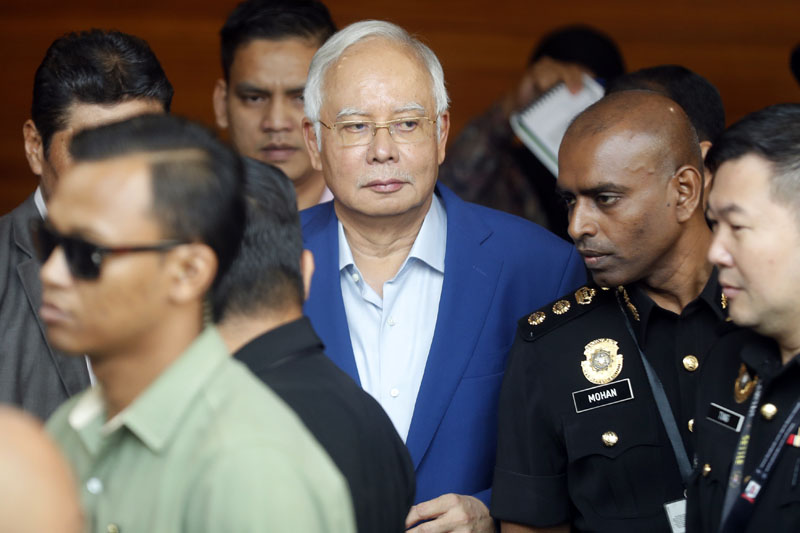Former Malaysian PM Najib questioned by anti-graft agency
PUTRAJAYA: Former Malaysian Prime Minister Najib Razak was interrogated Tuesday over a corruption scandal that could lead to criminal charges against him as the country's new anti-graft chief said investigations into the case were suppressed by intimidation during Najib's rule.
Najib was summoned by Malaysia's Anti-Corruption Commission nearly two weeks after the defeat of his long-ruling coalition in national elections, a loss partly blamed on public anger over alleged graft at the 1MDB state investment fund that Najib set up. US investigators say Najib's associates stole and laundered $4.5 billion from the fund between 2009 and 2014, some of which landed in Najib's bank account.
Swarmed by reporters, Najib looked calm and smiled as he was escorted into the commission's offices. At a news conference, new commission chief Mohamad Shukri Abdull said criminal charges against Najib could come "very soon" but that he won't be arrested Tuesday.
Shukri led investigations in 2015 of suspicious money transfers into Najib's bank account but flew to the US after Malaysia's attorney general, who planned to press charges against Najib, was sacked and Shukri heard rumors he himself would be arrested for an alleged conspiracy to topple the government.
Najib has denied any wrongdoing since the scandal erupted in 2015. As prime minister, he sacked critics in his government and muzzled the media to try to survive the fallout.
"Let the law take its course," Shukri told the news conference. He said evidence for the domestic money trail has been completed but it could take "a long time" to investigate the money trail abroad and talk to witnesses. The findings of Malaysia and US investigations are "almost similar," he said.
The former prime minister and his wife have been barred from leaving the country after the new government reopened an investigation into the scandal. Police have raided his home and other properties linked to him, seizing hundreds of expensive designer handbags and luggage stuffed with cash, jewelry and other valuables.
Najib's questioning at the anti-graft agency was specifically over why 42 million ringgit ($10.6 million) was transferred into his bank account from SRC International, a former unit of 1MDB, using multiple intermediary companies. The money was in addition to about $700 million that US investigators said landed in Najib's bank account.
A new attorney general in 2016 cleared Najib of wrongdoing, saying a particular transfer of $681 million was a political donation from the Saudi royal family and that most of it was returned.
Shukri said following that statement, anti-graft investigators were referred to a "questionable prince" from Saudi Arabia who claimed he donated the money to Najib but couldn't produce any supporting documents.
He related the pressure he faced in 2015, saying he was threatened and witnesses disappeared. He declined to say who issued the threats. Just a day before Abdul Gani Patail was sacked as attorney general by Najib in July 2015, Shukri said they met and Gani asked him if he was ready for charges to be filed against the prime minister.
In an emotional moment, he said he felt guilty for fleeing to the US as his men in the agency were removed or transferred.
New Prime Minister Mahathir Mohamad has said investigations showed the wrongdoing at 1MDB were more serious than expected.
Mahathir, who was premier for 22 years until 2003 and was spurred out of retirement by the 1MDB scandal, has vowed there will be "no deal" for Najib and he will face the consequences if found guilty of wrongdoing.
The current attorney general has been put on leave and Abdul Gani was appointed as a member of a new task force investigating the state fund.
The US Justice Department said in a statement that it looks forward to working with Malaysian law enforcement in investigating the 1MDB case.
"The Department of Justice is committed to ensuring that the United States and its financial system are not threatened by corrupt individuals and kleptocrats who seek to hide their ill-gotten wealth," it said. "Whenever possible, recovered assets will be used to benefit the people harmed by these acts of corruption and abuse of office."






